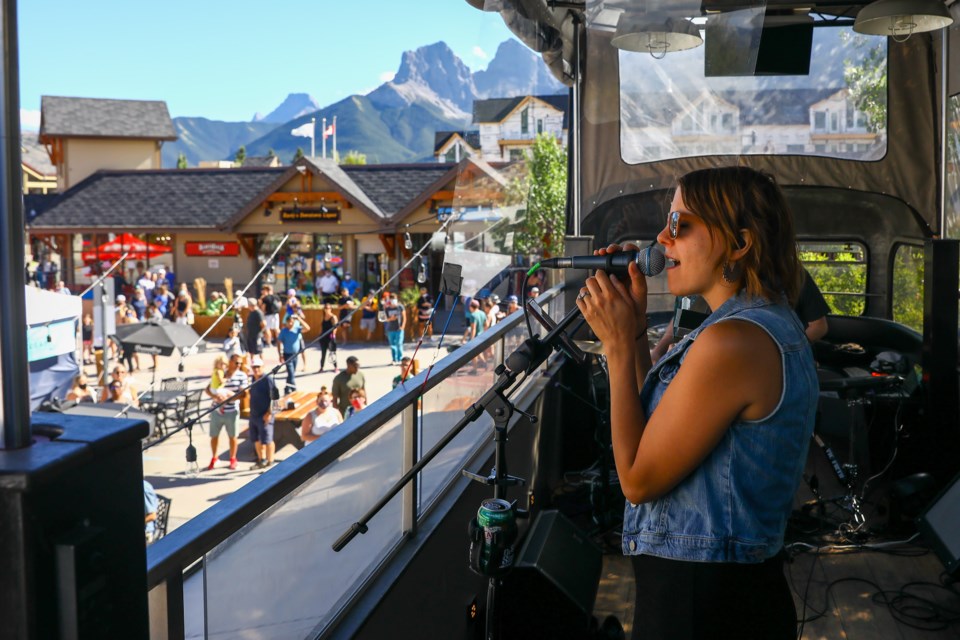BOW VALLEY – The stages of the Bow Valley bar scene have gone dark once again.
The recently enhanced measures designed to control the spike in COVID-19 cases in Alberta have put a halt to what was already a tentative and tightly controlled return to music played in front of an audience.
The Drake Public House in Canmore has been a live music venue since the early 1990s, but after reopening when the spring lockdown was lifted, indoor performances were still prohibited. According to David Atkinson, general manager at the Drake, those restrictions weren’t eased until early fall.
“We started back at the beginning of September,” Atkinson said, “when we were allowed to have singing inside. The Alberta Health Services rules for indoor entertainment included having any performer on stage being four meters away from any seated patron.
“We were not supposed to aid in the setup and they were to provide all equipment such as mics, speakers and soundboard etc. As well, they had to wear a mask while singing and limit the length of their sets to no longer than 30 minutes, with a 10-minute break between sets.”
The new rules announced by the provincial government a week ago Tuesday (Nov. 24) has put another hold on the in-person concert experience.
Northern Quarter are a four-piece ensemble featuring Dave Crewe on drums, backing vocals and samples, Wendy Crewe on bass, Carlos Nadeau on guitar and Kerry Hunter on guitar and lead vocals.
The band had been enjoying a good run of form recently, but the COVID-19 protocols have made them adjust to a new reality. Many venues opted for single performer acoustic sets because it was harder to manage larger bands with the four-metre rule in effect.
“One of the frustrating things really,” Dave Crewe said, “is that we won the award [the YYC Music Award for Group of the Year in September] and we’ve been unable to capitalize on it. It’s this incredible thing and trying to get any movement on the back of that, which would have been gigs in Calgary, higher profile gigs than we’ve been doing as well, is just not possible. The gigs aren’t there.
“Parallel to that, we spent some time in our jam space, staging it for streaming. We blanked off all the back walls with black curtains … we got some cameras and set up a computer and learned an awful lot about streaming to try and go ahead and do some stuff online.
“And we were just about ready, I’d done some test streams with [the band] Zebra … and then these restrictions came in on Tuesday, which means the band can’t even be in the same room together anymore.”
The hope is case counts will come down, restrictions will be eased, and Northern Quarter can get together again to play on line and finish laying down tracks for a new album that’s in the works. Performing live in person will probably take a little longer.
For Banff-based musician Geoff Hilhorst being away from the stage has an ache that is palpable.
“I miss it like mad,” Hilhorst said. “I miss seeing live music and being taken away by it. I miss playing live music and having that special connection with my fellow bandmates and the audience. But, we all miss it.”
Hilhorst contributed on keyboards to a single on Northern Quarter’s upcoming album. Back on Nov. 6, Hilhorst also sat in with Barney Bentall and the Cariboo Express at the Calgary Music Centre for their live stream concert benefiting Classroom Champions, a non-profit that delivers a social and emotional learning curriculum and mentorship programs to children from kindergarten to Grade 8. It was his first gig since February.
“Music is something we can all identify with,” Hilhorst said. “There is always a song that affects us. Music is a powerful emotional force for both the artist playing and the audience watching and listening. This kind of power, and the people it takes to drive it, will ensure its comeback and long-term survival. It just might take a while.”
The music industry in Canada employs over 70,000 people, not including the musicians themselves. The promoters, agents, publicists, light and sound technicians and roadies are just as heavily invested in the process as the people up on stage.
“We will be back,” Hilhorst said, “and when music does come back it will signify things are officially back to normal.”




